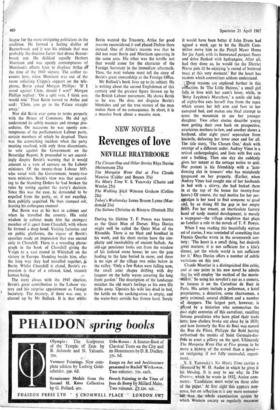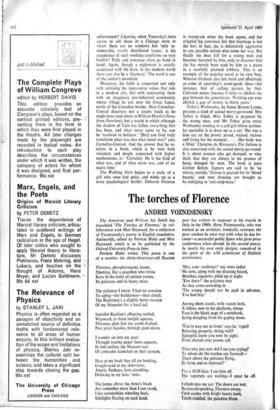NEW NOVELS
Revenges of love
NEVILLE BRAYBROOKE
The Marquise Went Out at Five Claude Mauriac (Calder and Boyars 35s) No Man's Time V. S. Yanovsky (Chatto and Windus 25s) The Walking Stick Winston Graham (Collins 25s) Tobey's Wednesday James Broom Lynne (Mac- donald 21s) The Sultans Christine de Rivoyre (Deutsch 25s)
During his lifetime T. F. Powys was known as the Quiet Man of Dorset. Rhys Davies might well be called the Quiet Man of the Rhondda. There is no blast and bombast in his work, and his short stories have the sim- plicity and inevitability of ancient ballads. An old-age pensioner looks out from the window of his isolated stone house; he sees the gate leading to the lane buried in snow, and there is no sign of the village two miles below in the valley. 'Only a few flakes were falling now, the small aster shapes drifting with dry languor on the hefty waves covering the long front garden.' The description of the landscape matches the old man's feelings as his own life drifts away. Upstairs his wife lies dead in bed, the kettle on the cooking-stove is empty, and the water-butt outside has frozen hard. Surely
it would have been better if John Evans had agreed a week ago to let the Health Com- mittee move him to the Pistyll Mawr Home for the Aged, with its beeswaxed parquet floors and drive flanked with hydrangeas. After all, had they done so, he would (as the District Nurse puts it) be enjoying 'a round of buttered toast at this very moment.' But the heart has reasons which committees seldom understand. a11ese reasons are explored further in this collection. In 'The Little Heiress,' a small girl falls in love with her aunt's lover, while, in 'Betsy Leyshon's Marathon,' a senile old lady of eighty-five cuts herself free from the tapes which secure her left arm and foot to her canopied bed, and makes one final attempt to cross the mountain to see her younger daughter. Two other stories describe young men getting their own back on prospective, avaricious mothers-in-law, and another shows a husband, after eight years' separation from his*.wife, defeating her lover once and for all. The title story, 'The Chosen One,' deals with revenge of a different order. Audrey Vines is a retired anthropologist, and lives with five cats and a bulldog. Then one day she suddenly gives her tenant at the cottage notice to quit. Her pretext is his friendship with a 'jazz- dancing slut in trousers' who has mistakenly trespassed on her property. (Earlier, when Audrey Vines had caught one of her husbands in bed with a skivvy, she had locked them in at the top of the house for twenty-four hours.) Of course, the real motive for her per- r eution is her need to find someone to goad and, by so doing fill the gap in her empty trait. For her tenant, an inarticulate factory hand of tardy mental development, is merely a scapegoat—the village simpleton that plays so familiar a role in the novels of T. F. Powys.
When I was reading this beautifully written set of stories, I was reminded of something that Francis Quarles wrote in the seventeenth cen- tury : 'The heart is a small thing, but desireth great matters; it is not sufficient for a kite's dinner, yet the whole world is not sufficient for it.' Rhys Davies offers a number of subtle variations on this text.
Claude Mauriac is a distinguished film critic, and at one point in his new novel he admits that he will employ 'the method of the movie- maker.' So using his novelist's eye as a camera, he focuses it on the Carrefour de Buci in Paris. His actors include a policeman, a hotel proprietress, a detective, some charwomen, a petty criminal, several children and a number of shoppers. The largest part, however, is pPayed by a historian who summarises the past eight centuries of this carrefour, recalling famous prostitutes who have plied their trade here; how cholera broke out close by in 1831; and how formerly the Rue de Buci was named the Rue du Pilori, Philippe the Bold having authorised the monks of Saint Germain-des- Pith to erect a pillory on the spot. Ultimately The Marquise Went Out at Five proves to be more a history of the crowd than a novel— an intriguing, if not fully successful, experi- ment. V. S. Yanovsky's No Man's Time carries a fcireword by W. H. Auden in which he gives it his blessing. It is easy to see why. In The Orators, which he wrote in 1932, Auden com- ments: 'Candidates must write on three sides of the paper.' At first sight this appears non- _sense, but on reflection is it any more nonsensi- la- than the whole examination system by which Western society so regularly measures
achievement? Likewise, when Yanovsky's hero agrees to sell shoes in a Chicago store in which there are no windows but 'only in- numerable, evenly distributed lamps,' is his acceptance of such working conditions so very foolish? Folly and nonsense often go hand in hand. Again, though a nightmare is usually associated with the dark, in the modern world there can also be a `daymare.' The word is one of the author's invention.
Moreover, his fable is concerned not only with satirising the topsy-turvy values that rule in a modern city, but with contrasting them with an imaginary pre-industrial community whose village he sets near the Great Lakes, north of the Canadian border. Here Cornelius- Conrad discovers not a utopia (such as he might have read about in William Morris'sNews from Nowhere), but a world in which although the shadow of Cain has fallen, everything that has been, and what never came to be, can be 'resolved in holiness.' [But] can God truly transform what was into what never was?' asks Cornelius-Conrad. And the answer that he re- ceives in a book, which is by turn both visionary and deeply concerned with higher mathematics, is : 'Certainly. He is the God of what was, and of what never was, and of no man's time.'
The Walking Stick begins as a study of a girl who once had polio, and winds up as a tense psychological thriller. Deborah Dainton
is twenty-six when the book opens, and her crippled leg convinces her that marriage is not for her; in fact, she is defensively aggressive to any possible suitors who come her way. But finally she does fall for a young man and becomes besotted by him, only to discover that she has merely been used by him as a pawn in a carefully planned robbery. This is an example of the popular novel at its very best. Winston Graham also hits hard and effectively at some of yesterday's avant-garde ideas—for instance, that of calling parents by their Christian names because it helps to abolish the gap between the generations. 'Nothing can ever abolish a gap of twenty to thirty years.'
Tobey's Wednesday, by James Broom Lynne, presents a kind of sexual merry-go-round. Mrs Tobey is frigid, Miss Tobey is pregnant by the wrong man, and Mr Tobey gives every Wednesday evening to a call-girl whose particu- lar speciality is to dress up as a cat. 'She was a lone cat on the prowl; proud, wicked, vicious and living for the moment. . . . Her body was a Mint.' Christine de Rivoyere's The Sultans is also concerned with the sexual merry-go-round. It is about women who get dumped, or who think that they are always in the process of being dumped by men. The book is pure kitchen fiction. Jaguars are said to be `so velvety outside,' Graves is praised for its 'blond beauty,' and men dressing are thought to be indulging in 'anti-strip-tease.'







































 Previous page
Previous page